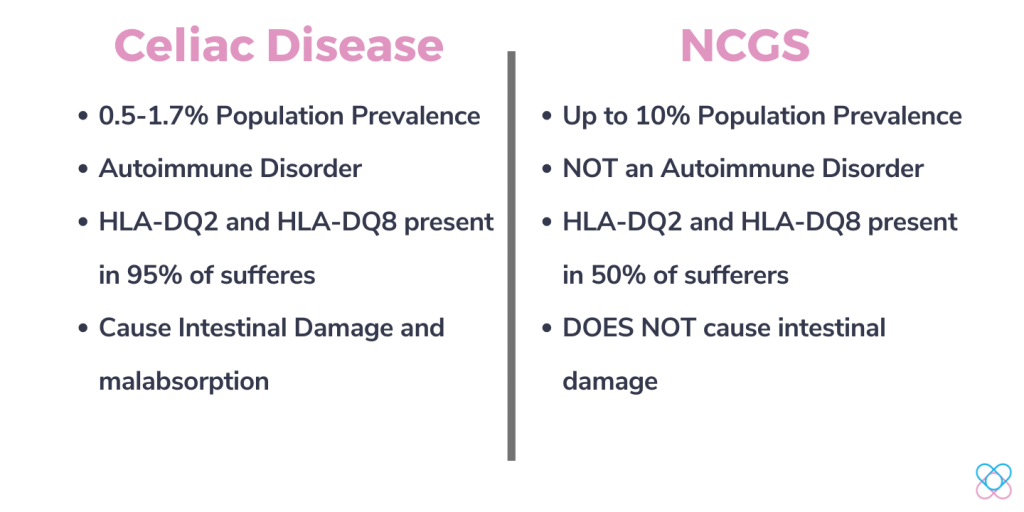
What do you think of when you hear the word gluten? For many of us, we are just reminded of the uprising of gluten-free diets endorsed by various public figures and celebrities. They swear upon various health benefits from avoiding gluten, giving rise to the trend of gluten-free food products being marketed these days. Yet, people are increasingly claiming gluten sensitivity and shifting towards the gluten-free diet without prior medical testing. Is this all just a nocebo effect or is there some truth to these claims?
What Exactly Is Gluten Sensitivity?
Gluten is a protein found in grains such as wheat, rye, barley, and more. It has been identified as the primary cause of gluten sensitivity leading to gluten-related diseases. In gluten-related disorders, the body reacts negatively to the ingestion of gluten giving rise to various symptoms of various degrees such as digestive problems and body aches. But how exactly does this one protein contribute to such disorders?
Celiac Disease
Celiac disease is an autoimmune disorder against gluten ingestion. It has a genetic predisposition where two chromosomal mutations, HLA-DQ2 and HLA-DQ8, allows white blood cells to recognize gluten as a foreign, harmful substance. These white blood cells then trigger an immune response leading to inflammation of the intestines and degradation of the villi. The villi are small finger-like projections in the intestine vital for nutrient absorption. Symptoms vary depending on age.

Diagnosis
Diagnosis of celiac disease is done via HLA-typing to detect the presence of the HLA-DQ2 and HLA-DQ8 mutations. Yet this test is not conclusive as only 1 to 4% of carriers will develop celiac disease. If mutations are present, an intestinal biopsy will be done to identify the presence of intestinal damage. A blood test can also be done to identify elevated levels of endomysial antibody (EMA) which is produced in the presence of gluten.
Non-Celiac Gluten Sensitivity (NCGS)
Non-celiac gluten sensitivity differs from celiac disease where an autoimmune response is not triggered upon the ingestion of gluten. Thus, celiac disease test results will be negative even though symptoms of gluten sensitivity are present. NCGS does not cause intestinal damage compared to celiac disease but does present some digestive symptoms. While celiac disease is very rare, NCGS prevalence has been shown inconclusive to be as high as 10% of a population.
It has been shown that the same mutations, HLA-DQ2 and HLA-DQ8, with a different nucleotide base variant may contribute to NCGS. The study into NCGS is relatively new, hence definitive causes and treatment options are still being researched. One of the possible causes of NCGS is the presence of FODMAPs in grains.
FODMAPS: Fermentable oligo,-di,-monosaccharides, and polyols
These are a class of carbohydrates that cannot be digested in the intestines. These include fructose and lactose which are used up by the gut bacteria producing hydrogen gas resulting in digestive symptoms.
Another possible cause of NCGS is an unidentified component of wheat which causes increased intestinal permeability which in turn allows the gluten to interact with white blood cells in the blood.
Symptoms include;
- Bloating
- Abdominal Pain
- Headache
- Mental Fatigue
Diagnosis
So, do you really have celiac disease or just NCGS? In both cases, you should always consult a medical professional. In the diagnosis of NCGS, your physician will first devise a program for gluten withdrawal followed by a double-blind placebo test. This will allow you to learn if your symptoms are caused by NCGS or if it is really just your belief in gluten sensitivity. Do keep in mind, these tests require you to already follow a normal diet with gluten included. Finally, in the case of NCGS confirmation, you will be advised on following a gluten-free diet.
The Major Differences Between Celiac Disease And NCGS

In The End,

While gluten sensitivity may vary among individuals, it is vital to identify if it is celiac disease or NCGS. With the rising trend of gluten-free endorsement, it is becoming increasingly harder to determine if one suffers from either affliction.
Ultimately, there is no cure for them. The only remedy is to avoid gluten-rich foods such as wheat and barley. Some alternative foods include quinoa, potatoes, and tapioca.
Thus, always consult a medical professional if you do experience recurrent symptoms.
Want to know if you have gluten sensitivity? Get yourself tested with DNA Explorer Prime or DNA Explorer Personal today!
References
1. Roszkowska, A., Pawlicka, M., Mroczek, A., Bałabuszek, K., & Nieradko-Iwanicka, B. (2019). Non-Celiac Gluten Sensitivity: A Review. Medicina (Kaunas, Lithuania), 55(6), 222. https://doi.org/10.3390/medicina55060222
2. Uhde M, Ajamian M, Caio G, et al.Intestinal cell damage and systemic immune activation in individuals reporting sensitivity to wheat in the absence of coeliac diseaseGut 2016;65:1930-1937.
3. Catassi, C., Elli, L., Bonaz, B., et al.(2015). Diagnosis of Non-Celiac Gluten Sensitivity (NCGS): The Salerno Experts’ Criteria. Nutrients, 7(6), 4966–4977. https://doi.org/10.3390/nu7064966